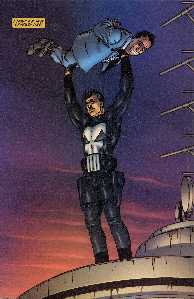 Dramatic violence is the most effective tool for telling the invisible tale of good and evil. Violent drama has been the hallmark of every major civilization since the Greeks. It is not a disease. It is an immunization against the disease.
Dramatic violence is the most effective tool for telling the invisible tale of good and evil. Violent drama has been the hallmark of every major civilization since the Greeks. It is not a disease. It is an immunization against the disease. Dramatic violence is the most effective tool for telling the invisible tale of good and evil. Violent drama has been the hallmark of every major civilization since the Greeks. It is not a disease. It is an immunization against the disease.
Dramatic violence is the most effective tool for telling the invisible tale of good and evil. Violent drama has been the hallmark of every major civilization since the Greeks. It is not a disease. It is an immunization against the disease.
Michael Moriarity, the mercurial and brilliant actor who portrayed Assistant Dist. Atty. Ben Stone in the first years of Law & Order—as quoted in the LA Times, 7/29/00
One major problem with this superficial claim. Greek drama, the model for all Western drama that followed, portrayed violence with consequences. Heroes who killed, who acted wrongly, suffered as a result. Which is why Greek dramas were so often tragedies.
The Iliad is the classic example. Hector kills Patroclus...and pays for it by being killed by Achilles, who drags Hector's body behind his chariot. Achilles, in turn, pays for killing Hector by getting the infamous arrow through his heel. Moral of the story? On the killing field, everyone suffers alike.
By the stricter definition of drama as a staged play, the classic Greek example is Oedipus Rex. Oedipus kills his father and marries his mother. He pays for his moral transgressions by having his eyes put out. As one website explains:
The tragedy of Oedipus Rex is not so much that Oedipus commits two horrible crimes; after all, he was fated to do so, and committed them unknowingly. It is, rather, that he, like his doomed parents before him, ran headlong into the destiny he was trying to defy, and then compounded his evils by his imperious refusal to believe the prophet's declaration of his guilt. Pride was his downfall. The Greeks had a distinct word for this: "Hubris," a heroically foolish defiance; the feeling that one is beyond the reaches of authority or convention.
Similar consequences show up in most Greek myths and dramas. When someone violates the established order, the gods wreak their vengeance. Violence...and consequence...is the hallmark of Greek drama.
Other people have made the same point. For instance, consider this quote from the LA Times, 5/11/01:
[R]evenge dramas—from Greek tragedies to American literature—illustrate the often disastrous moral consequences of pursuing revenge. Such works as "Hamlet" and "Moby Dick," for example, show the lead characters' vengeful obsessions costing them their lives.
In contrast, today's movies, TV shows, rap songs, video games, and comic books often don't show the consequences of violence. They convey the simplistic message that might makes right, not that good triumphs over evil. People love these products not because they instill moral responsibility, but because they ignore it. Because they free people to act out their selfish impulses.
Drama that shows the consequences of violence, such as Saving Private Ryan, may be a cure. Drama that's simply violent is the disease. Sadly, Moriarity has failed to distinguish between the two.
Related links
Justice...or revenge?
Violence in America
America's cultural mindset
|
. . . |

|
All material © copyright its original owners, except where noted.
Original text and pictures © copyright 2007 by Robert Schmidt.
Copyrighted material is posted under the Fair Use provision of the Copyright Act,
which allows copying for nonprofit educational uses including criticism and commentary.
Comments sent to the publisher become the property of Blue Corn Comics
and may be used in other postings without permission.